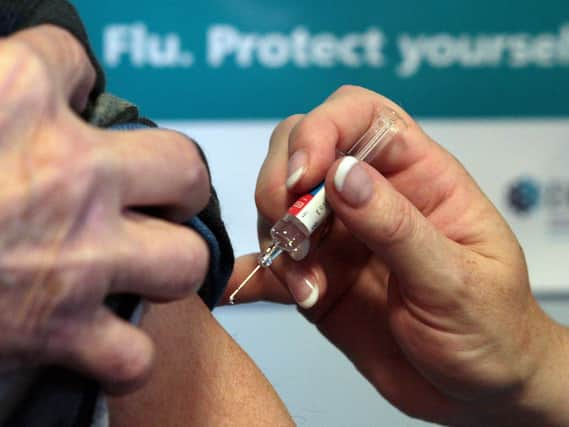Concerns about the flu jab must be addressed if Government is to double uptake this winter


Plans were announced last month for the “most comprehensive flu vaccination programme in UK history” increasing take-up from 15 to 30 million, to reduce pressure on the NHS.
While uptake is around 70 to 80 per cent for the over 65s, among the at risk under 65s, rates are well below World Health Organisation (WHO) guidelines.
Advertisement
Hide AdAdvertisement
Hide AdIn Yorkshire and the Humber the proportion of under 65s in at risk groups having a jab has fallen nine per cent in five years.
Academics and charities believe legitimate concerns around side effects, religious barriers and a “complacency” around the effects of flu are putting people off.
Others say the Government has failed to deliver an effective strategy - leaving rates languishing below the WHO recommended 75 per cent take-up for vulnerable categories.
In Leeds the figure fell 9.1 per cent over five years to 44.1 per cent, while in Hull it dropped eight per cent to just 41.3 per cent.
Advertisement
Hide AdAdvertisement
Hide AdThere is also concern that not enough primary schoolchildren are being vaccinated.
Bradford had the lowest percentage of youngsters in the region receiving the nasal spray at 44.9 per cent, followed by Leeds at 51 per cent. The East Riding was England’s top performer at 82 per cent.
Director of the Vaccine Confidence Project, Professor Heidi Larson, said vaccination is important this year so people avoid the “double attack” of Covid-19 and flu. Part of the nasal vaccine contains traces of porcine gelatin, preventing many Muslim parents from taking it up. Another issue is how effective it is.
She said: “Some years it really isn’t that effective against all strains. But I would certainly urge people to take it anyway as you wouldn’t want the strains that it does protect against.”
Advertisement
Hide AdAdvertisement
Hide AdEmma Rubach,from Asthma UK, said the drop in uptake among at risk groups including those with asthma was “deeply concerning”.
She said: “Unfortunately, there are lots of myths about the flu vaccine not working, causing side effects or causing flu, and our previous research shows this is preventing people from getting it.
"The reality is, asthma and flu is a potentially lethal combination and the flu vaccine is the best way to prevent someone falling ill."
The Department for Health and Social Care said it had some of the best flu vaccine uptake rates in Europe and there would be a major marketing campaign this year to encourage eligible people to have a jab.
Advertisement
Hide AdAdvertisement
Hide AdA spokesperson added: “With Covid 19 still likely to be circulating during flu season, it is more important than ever to have the flu vaccination and we urge anyone who is eligible to take up the offer of vaccination to help relieve pressure on the NHS and save lives.”
Where possible this year parents will be offered an injectable vaccine if they refuse the nasal vaccine because it contains porcine gelatine.
The nasal vaccine - live attenuated influenza vaccine - is the most effective in children.
Who is eligible for a flu vaccine?
Up until this year, the vaccine was eligible to those who were
*65 years old or over
*Pregnant
Advertisement
Hide AdAdvertisement
Hide Ad*Under 65 and living with underlying medical conditions such as chronic asthma, MS and diabetes.
*Living in a long-stay residential care home or another long-stay care facility
*Receiving a carer's allowance, or are the main carer for an elderly or disabled person whose welfare may be at risk if you fall ill.
However the government has decided to expand those eligible to receive it in 2020-21.
The vaccinations will be delivered in two stages.
Advertisement
Hide AdAdvertisement
Hide AdStage one will see a free flu vaccine made available to people who are on the shielded patient list and members of their household as well as:
*All school year groups up to year 7
*All people aged over 65
*Pregnant women
*Under 65s with pre-existing conditions including at-risk under 2s
The government says that once vaccination of the most ‘at-risk’ groups is under way, the department will work with clinicians to decide when to open the programme to invite people aged 50 to 64, with further details to be announced.
The NHS will contact people directly, including information about where to go to get the vaccine.
Comment Guidelines
National World encourages reader discussion on our stories. User feedback, insights and back-and-forth exchanges add a rich layer of context to reporting. Please review our Community Guidelines before commenting.